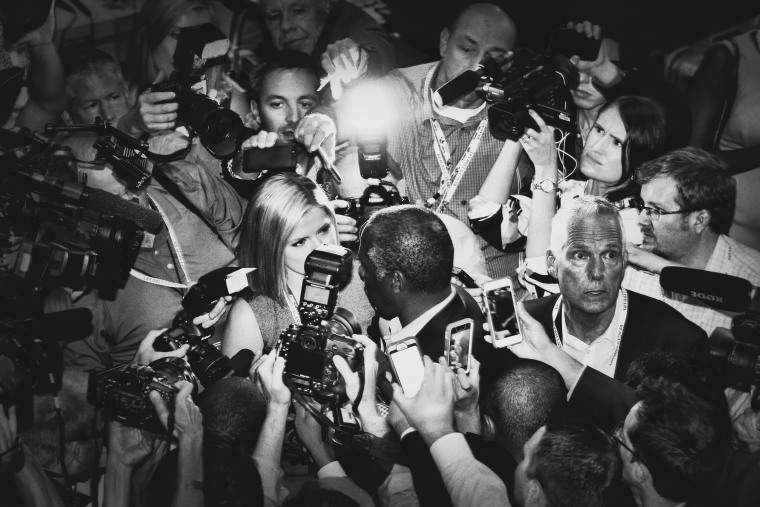SIMI VALLEY, California -- To hear Donald Trump, Scott Walker and Ben Carson tell it, they all won the second Republican primary debate on Wednesday night.
Trump said he had the biggest applause line of the night, while Walker insisted he “set the tone early on” and Carson said he “schooled” Trump on vaccinations.
Welcome to the spin room, where facts are what you make them and every candidate’s a winner.
Spin rooms -- the space set aside for candidates and their surrogates to reframe their debate performances, explain away any gaffes and deploy the one-liners they missed on stage -- are typically chaotic affairs.
But Wednesday night’s event in Simi Valley, California, reached new heights of chaos.
"It felt like being in a mosh pit at a Soundgarden concert. It’s crazy. As soon as the candidates come in here, it’s a madhouse."'
It was a uniquely American spectacle: In a far corner of the room, Donald Trump, mobbed by reporters, insisted with typical bluster that he was the best of the night. Near the entryway, Clay Aiken, an "American Idol" runner-up, analyzed Trump’s performance for Entertainment Tonight. A team from the satire website Funny or Die conducted interviews about “truffle butter.” The former and current chairmen of the Republican National Committee wove through the crowd, offering their own takes.
And it all happened on the grounds of the library dedicated to one of the GOP’s most revered presidents, Ronald Reagan, a former actor himself with a flair for the dramatic who would’ve been right at home in the post-debate scrums Wednesday night.
Because of the anything-goes nature of spinning reporters -- essentially rewriting the facts to suit your own, invariably positive, narrative -- all rules and social mores seem to break down when the candidates enter the room.
Reporters throw elbows, jockeying for position to ask a question or get the perfect shot. They shout over and at each other and the candidate; they hiss angry directives: “Put your mic down!” or “Move your head!” In the scrum surrounding Trump at the first debate, a reporter was trampled.
Wednesday night’s spin room saw no casualties, but the pace was just as frenzied. Reporters trailing cameras gathered six-deep at the entry and exit into the room, ready to pounce.
Alex Scordelis, a writer and on-camera talent covering the event for Funny or Die, said he was taken aback by the scene.
"It felt like being in a mosh pit at a Soundgarden concert,” he said. “It’s crazy. As soon as the candidates come in here, it’s a madhouse,” he said.
One cameraman, jostled out of his position at the starting gate, joked to his antagonist, “C’mon man -- I gotta eat too -- I got children at home to feed!”
When you’re one of the more than 300 reporters at the debate, sometimes the spin room feels that dramatic.
But the real impact of the post-debate message-minding is barely life or death for the candidates -- veteran reporters say they aren’t swayed by what they hear.
Ed O’Keefe, national political reporter for The Washington Post, said he found it “notable” that more candidates were coming to spin rooms than they have in the past.
But did they affect his analysis? “Nope.”
Christina Bellantoni, the Los Angeles Times’ assistant managing editor for politics, said she uses the volume of candidate surrogates to take a read on how the candidates think they did. She noted that Sen. Ted Cruz had a small army of surrogates out singing his praises, “which usually happens when you’re not doing so well.”
But overall, “it’s stupid.”
“The spin room in general -- why do you need spin? You saw it” during the debate, she said.
Even the surrogates, whose job it is to paint a rosy picture of their candidate’s performance, can’t muster the same message-discipline to argue the spin room matters.
“All spin rooms are the same,” said Ana Navarro, a Florida GOP strategist and Bush backer.
“They’re full of people supporting somebody or another, saying they did the best of everyone on the stage.”
Navarro’s advice? “Take half of what they say.”
